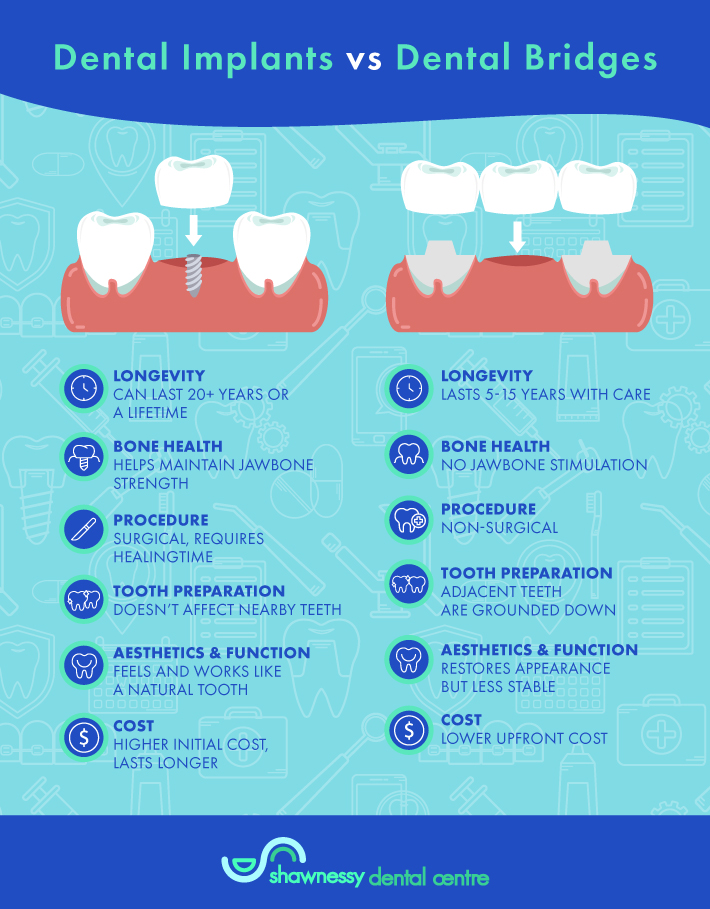Losing a baby tooth is exciting and often the first milestone of growing older—the same doesn’t hold true if you accidentally lose one (or many) of your adult teeth.
Dental bridges and dental implants are two popular solutions for rebuilding your beautiful smile. While both serve similar purposes, they differ in design, benefits, and suitability depending on individual needs.
One solution isn’t necessarily better than the other; it truly depends on a person’s unique case. The only way to know which option aligns with you is by visiting your dentist for a thorough evaluation.
Why Invest in Smile Restoration?
After the shock wears off, a missing tooth (or multiple teeth) may not seem like a big deal. Missing teeth can take a hit on most people’s confidence, but more than that, this concern can seriously affect your oral health.
When a tooth is lost, the surrounding teeth shift, leading to misalignment and bite concerns over time. If you’re someone who’s invested in orthodontics, this is far from ideal. Additionally, gaps left by missing teeth can make it more difficult to chew food or speak.
Perhaps most importantly, missing teeth can cause jawbone deterioration. Bone tissue relies on stimulation from the teeth roots to remain healthy and strong. Without proper anchoring, the jawbone can become weaker.
Rebuilding your smile with dental bridges or implants is essential for safeguarding oral health. Now the focus shifts to finding the right solution for you.
What Are Dental Bridges?
A dental bridge is a custom-made replacement for one or more missing teeth. It “bridges” the gap left by missing teeth, anchored by the natural teeth on either side (known as abutment teeth) or dental crowns.
The bridge can be made from various materials, such as porcelain, ceramic, or metal alloys, allowing it to blend naturally with your existing teeth.
What Are Dental Implants?
Dental implants provide a more permanent solution for missing teeth.
A titanium post, acting as an artificial tooth root, is surgically implanted into the jawbone. Once the jawbone has healed and the implant has settled into the bone (a process called osseointegration), a crown is attached to restore the appearance and function of a natural tooth.
Dental Bridges vs Dental Implants: Key Differences
Dental bridges and implants share a purpose: they effectively restore missing teeth and maintain oral health. What separates these two treatments is their design and benefits, which influence which option better aligns with a person’s oral health.
Here’s a closer look at the key differences between dental bridges and implants:
Longevity
Dental implants were created to be a long-term solution, often lasting decades (20+ years) or even a lifetime with proper care. Caring for dental implants is as simple as standard brushing, flossing, and routine check-ups.
Meanwhile, even with proper care, dental bridges typically last 5 to 15 years before needing replacement or repair. Besides, bridges need extra attention to clean underneath the artificial tooth and may require specialty tools for maintenance.
Once you’ve made your choice, your dentist will go over proper cleaning and care habits for either dental bridges or implants.
Bone Health
Dental implants offer a unique advantage. The titanium post replaces the tooth root and stimulates the jawbone. This helps maintain bone density and prevent bone loss.
Bridges are great, but do not offer this benefit, and extended use may lead to changes in the jawbone structure over time.
Procedure
Inserting a titanium post into the jawbone requires surgery, making dental implants an invasive procedure. After healing, the crown is placed. When you factor in preparation, surgery, healing time, and the placement of the crown, the entire dental implant process can take several months.
Bridges are less invasive, as they use adjacent teeth as anchors, and generally don’t involve surgery. In contrast, the process for dental bridges can be finished within a few visits.
Tooth Preparation
Dental bridges require the surrounding teeth to be ground down to support the bridge structure. Implants are independent and do not affect neighbouring teeth, preserving their natural state.
Aesthetics & Function
Both options restore the appearance of a natural smile. Implants, however, closely mimic a natural tooth’s function, providing better support and stability for chewing than dental bridges.
Cost
The dental implant process is complex and invasive, which is why it has a higher upfront cost. Over time, with proper maintenance and care, dental implants become a more affordable option in the long run, as they can last a lifetime.
Bridges offer a more affordable route (initially), but their shorter lifespan may lead to additional costs in the long term. That said, a dental bridge that lasts 5 years is still a solid choice.

Which Option Is Right for You?
There are several nuances to this question, and the answer isn’t always straightforward.
Your choice will depend on several factors, including your oral health, lifestyle, and budget. Here are some considerations:
- Bone density: You need a healthy jawbone to support dental implants. If significant bone loss has occurred, you may need a bone graft before implant placement.
- Overall health: Dental implants require a surgical procedure. For patients with certain medical conditions, bridges may be better.
- Budget: While dental bridges offer a more affordable solution upfront, implants may provide better long-term value.
Regardless of which option you’re leaning towards, the only way to know for sure is by visiting your dentist. They can recommend the most appropriate course of treatment that aligns with your specific needs and oral health.
Take the First Step Towards Restoring Your Smile
When it comes to replacing missing teeth, dental bridges and implants are excellent options that can rebuild your smile, support your oral health, and improve your quality of life.
Bridges provide a quicker, minimally invasive, and affordable solution, while implants are a durable, natural-looking option, but require surgery. Each option has its benefits and drawbacks. Luckily, this isn’t a decision you have to make alone.
Our Shawnessy Dental Centre team is here to help. We’ll walk you through all the options, explain the procedures, and recommend the treatment that best suits your unique facial features. Contact our team to schedule an appointment.


